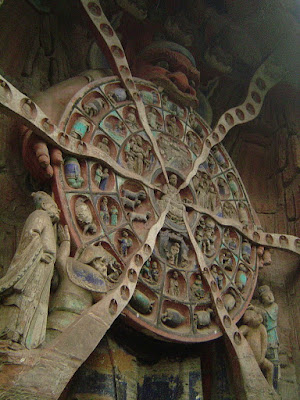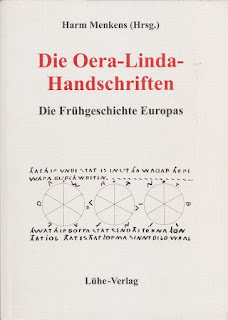 |
| 'Truth coming from the well armed with her whip to chastise mankind' by Jean-Léon Gérôme (1896) |
waarheid - Dutch, Afrikaans
wierheid - Frisian
Wourecht - Luxembourgian
gwirionedd - Welsh
vérité - French
verità - Italian, Corsican
veritat - Catalan
verdad - Spanish
verdade - Portuguese
(veritas - Latin)
(The Scandinavian words for 'truth' are related to English: sound, German: gesund, Dutch: gezond)
sandhed - Danish
sannhet - Norse
sanning - Swedish
sannleikur - Icelandic
Oera Linda fragments with my provisional translations:
[118/20] Gosa: Expulsion of Blacks
NW WINSTIK WEL THÀT MINA ÀFTERKVMANDA THÉRVP LETTA.
HO FÉR GOSA WÉRHÉD SPREK.
I hope my descendants will ascertain
to what extent Gosa was right [lit.: spoke truth].
[140/18] Yesus or Buda, Krisen, Fo
MEN AS THA PRESTERA SKILUN WÁNA
THÀT HJA ALLET LJUCHT FON FRYA ÀND FON JES.US LÉRE UTDÁVATH HÀVA.
SÁ SKILUN THÉR IN ALLE WRDA MÀNNISKA VPSTONDA
THAM WÉRHÉD IN STILNISE AMONG EKKORUM WARATH
ÀND TOFÁRA THA PRESTERA FORBORGEN HÀVE.
THISSA SKILUN WÉSA UT FORSTA BLOD. FON PRESTERUM BLOD
FON SLÁVONUM BLOD ÀND FON FRYA.S BLOD.
THAM SKILUM HJARA FODDIKUM ÀND THÀT LJUCHT BUTA BRINGA
SÁ THAT ALLERA MÀNNALIK WÉRHÉD MÉI SJAN.
HJA SKILUN WÉ HROPA OVERA DÉDA THÉRA PRESTERA ÀND FORSTA.
THA FORSTA THÉR WÉRHÉD MINNA ÀND RJUCHT
THAM SKILUN FON THA PRESTERA WIKA.
When the priests will imagine, however,
that they have entirely extinguished the light of Frya and of Yesus' teachings,
people will rise in all regions,
who have silently treasured truth among each other,
hiding it from the priests.
They will be of royal blood, of priestly blood,
of slaves' blood and of Frya's blood.
They will bring their lamps and the light into the open,
so that everyone may see truth.
They will condemn the deeds of the priests and princes.
The princes who love truth and justice
will separate themselves from the priests.
(the above fragment in the original manuscript:)
~ ~ ~
The word TRVTH is also used once:
[101/09] Primal Teachings 2
SEND THÉR SVME THAM HJARA RENKA FRODA ÀNDET BÁR MAKJA
ALSA WRDON HJA THRVCH HJARA RAKKERA FÀT ÀND VMBIRA LASTER VRBARNAD
ELLA MITH FÉLO STÁTSKA PLÉGUM HJARA FALXA DROCHTNE TO.N ÉRE.
MEN IN TRVTH. ALLÉNA THÉRVMBE THÀT HJA.RA NAVT SKÁDA NE SKOLDE.
If there are any who see through their vile tricks and try to expose them,
these are caught by their henchmen and burnt for their defamation —
always with solemn ceremonies, in honour of their false divinities —
but in truth, it is only to protect the priesthood.

































